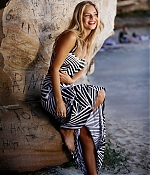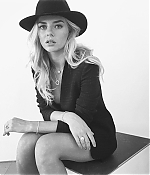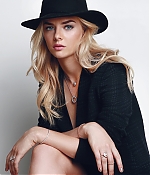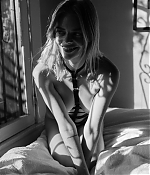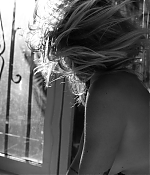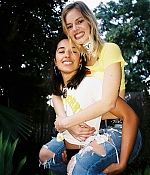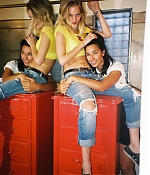Samara Weaving Talks MAYHEM, THREE BILLBOARDS And Her Uncle Hugo
The Australian actress is making a name for herself in American-accented roles.
Actress Samara Weaving first came to prominence in her native Australia in several seasons of the soap opera Home and Away, a youth-oriented show that nonetheless tackled a number of controversial topics. Since making the move to American features, she has continued to specialize in confrontational fare, with roles in the just-released Mayhem and Three Billboards Outside Ebbing, Missouri and this past fall’s Netflix original The Babysitter.
After making her feature debut opposite her uncle, Aussie film mainstay Hugo Weaving, in the crime thriller Mystery Road, Weaving took a three-episode stint in the first season of Ash vs. Evil Dead. (She found herself at the center of unpleasant controversy when a photo of her in bloody test makeup for that show was circulated on-line by conservatives falsely claiming her to be a Trump supporter victimized by “liberal bullying.”) After breaking into Hollywood with a turn in Monster Trucks—coincidentally, opposite Evil Dead remake star Jane Levy—she landed the title role in McG’s The Babysitter and a lead in Mayhem, Joe Lynch’s outrageously satirical bloodbath set in a quarantined office tower where everyone becomes afflicted by a virus that removes their inhibitions, leading them to act upon their basest impulses.
Weaving’s Melanie Cross has had her home foreclosed upon by the ruthless Towers and Smythe law firm, and teams with Derek Cho (Steven Yeun), who has been framed and fired by the company’s higher-ups, to exact some violent payback. Lynch has said that he could acutely relate Mayhem’s premise to his own time toiling in the corporate world, and while Weaving hasn’t had the same experiences, she agrees regarding the scenario’s appeal. “Fortunately, I’ve been working in the industry I’ve wanted to work in since I was 14,” she says. “So I haven’t really been part of an office, but I can definitely relate to that feeling of wanting to punch a superior in the head! It’s a universal premise where your workplace is sometimes not the greatest, and I think that’s one of the reasons why the film has been received so well, because it lets you live out that fantasy that we all have—of taking out everyone in the office that rubbed you the wrong way [laughs].
“The biggest appeal for me,” she continues, “was having a very strong female role in a horror/comedy. Normally they’re the first to die, or they’re screaming the whole time and not knowing what’s going on. Melanie is arguably the toughest one out of all of them, so I was really attracted to that.”
Although shot on a modest budget and schedule, Mayhem showcases elaborate, hardcore action setpieces worthy of a much bigger feature, which Weaving threw herself into. “We had a wonderful stunt team who coached us through it and made sure we were always safe,” she recalls. “The hardest thing to shoot was Steven’s and my showdown with the Siren [Caroline Chikazie] and her minions. It was a lot of blocking and making sure that we kept the stunts believable yet still appropriate, but it was a lot of fun. That bit where Derek pauses to put on his favorite fighting song—that was brilliant. I also loved shooting the scene where Derek and I come in and they’ve chopped someone’s tongue off, and I’m playing with it, and I’m sort of at the peak of the virus at that time, so I’m quite manic.”
To prepare for all the Mayhem, Weaving reveals, Lynch would host movie nights with his actors, where they would dissect relatable films and their characters. “We watched The Hateful Eight, and that was really cool. We loved the female characters, and it’s so bloody as well, so seeing how they pulled off that violence while still having a giggle was very helpful. Joe created a safe environment for such a crazy film, while still allowing for a lot of over-the-top performances. You really felt he had your back. We collaborated to make sure we were all on the same page, though the script [by Matias Caruso] really spoke for itself; you could sort of hear the laughter and the shock when you read it, and that translated to the screen.”
Weaving had a similar reaction when she first read the screenplay for The Babysitter, in which her character Bee seems to have a sisterly affection for the young boy (Judah Lewis) she’s looking after, but later proves to be the leader of an amateur satanic cult anxious to sacrifice him. “I loved that there was an entire page that just said ‘WHAT THE FUCK?’ on it, and then they actually put that up on the screen,” she says.
Like Mayhem, The Babysitter splattered Weaving with plenty of artificial gore. “My bathtub was pink by the end of all that—my hair was pink, everything was pink. But you know, the fake blood is actually delicious; it’s made of some kind of syrup, so that was a bonus!” For all the over-the-top action, some of the actress’ best moments in The Babysitter are the quieter ones, in which she and Lewis’ Cole bond over an apparent shared love of geek culture. “Judah and I got along so well!” she says. “I love the scene in the kitchen where we’re talking about our dream team [of sci-fi heroes] to beat the ‘big bad.’ That was a lot of fun, just me and Judah in the room together.”
From those two violently assertive roles, Weaving switched gears for her part in Three Billboards. “I play Penelope, the very young girlfriend of Charlie [John Hawkes], who’s very naive. She doesn’t quite know what’s going on, and gets confused between polio and polo [laughs]. It was a nice change to play something at polar opposites to Mayhem.”
Written and directed by savage-comedy specialist Martin McDonagh, Three Billboards surrounds Weaving with a remarkable ensemble cast: Frances McDormand, Woody Harrelson, Sam Rockwell, Peter Dinklage, Hawkes et al. “I had to pinch myself; it was surreal,” she says. “I was so nervous at first, but they were all so loving and welcoming, and treated me very well. I’ve been a fan of Martin McDonagh for so long, so working with him was a memorable experience. He asked for a lot of rehearsal time, which was very helpful, but everything was all there in the script. He wrote it so beautifully that the words just came off the page and firmly established those characters.”
In addition, McDonagh surmounted the challenge—also faced by Lynch and McG—of balancing dark, violent subject matter with humor. “It’s such a fine line to walk down,” Weaving acknowledges, “and all of those directors walked it perfectly. They got it down cold, and they made it look so effortless, you can’t see all the hard work that went into it.”
Weaving, who can also be seen in Showtime’s SMILF and recently wrapped an Amazon series remake of the Peter Weir classic Picnic at Hanging Rock (“It’s based on the book, so it’s different from the film, but I can’t say much more than that”), notes that having an uncle in the business wasn’t a key motivator in pursuing the craft. “I grew up all over the place, and Hugo stayed in Australia,” she explains. “I was born in Adelaide, and then we moved to Fiji and Singapore and Indonesia and Italy for a bit, and I didn’t come back to Australia till I was 13 or 14. Obviously my uncle is a fantastic actor and I really look up to him, but I got into acting because I was so shy as a kid, and moving around a lot, it was difficult for me to make friends. So my parents thought it would be a good idea to put me into a drama school, and it stuck.”
While she’s a big fan of Hugo’s work (“I love seeing him in the theater, on stage, and of course The Matrix is amazing”), her first exposure to his screen career left her a little perplexed. “It was The Adventures of Priscilla, Queen of the Desert, an Australian classic, and he’s in drag for most of it. I think I was 12 when I saw it, and I was like, ‘Why is Uncle Hugo wearing a dress?’ [Laughs] ‘He’s an actor, that’s what he does!’ That was very funny.”


